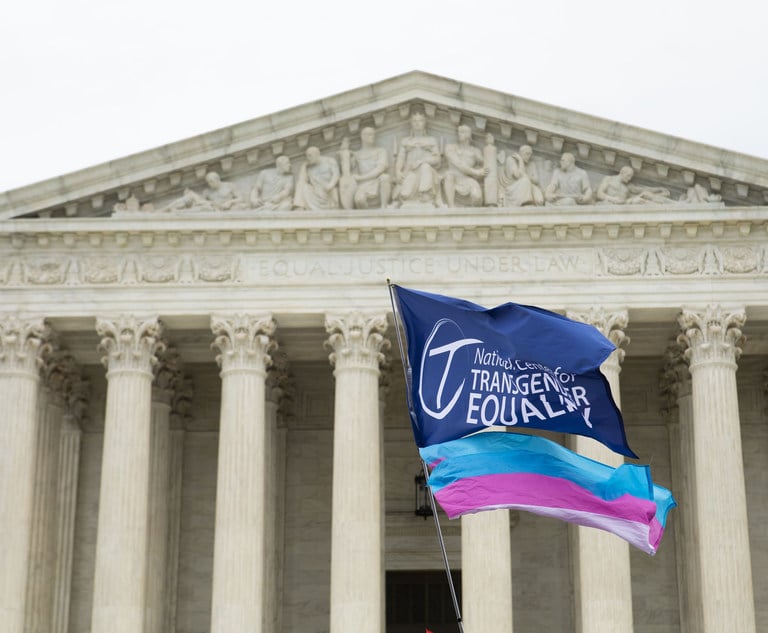Supreme Court Should Take This Gender-Pay Case, Jones Day Team Argues
Jones Day, representing Fresno's school superintendent, wants the U.S. Supreme Court to reverse a Ninth Circuit ruling that said employers are forbidden from using pay history to justify paying men and women differently for comparable posts.
September 04, 2018 at 05:26 PM
5 minute read

The U.S. Supreme Court should consider whether employers can use prior salary history to justify paying men and women differently, a common employment practice whose legality has divided federal courts and, critics say, perpetuated the gender pay gap.
Lawyers from Jones Day, representing a California school district, have asked the Supreme Court to take up the case Yovino v. Rizo as the vehicle to determine whether and when an employee's salary history should be considered.
Fresno County Superintendent of Schools lost before the U.S. Court of Appeals for the Ninth Circuit. Settlement talks between Fresno and math consultant Aileen Rizo failed, prompting the school district to turn to the Supreme Court.
The pay equity case spotlights a common hiring practice that equal pay advocates argue institutionalizes the gender wage gap in which women make 80 cents on the dollar on average to men in comparable positions. Management-side firms predicted the case could push employers to examine their pay practices.
Jones Day partner Shay Dvoretzky represents Fresno County. He declined to comment. Dan Siegel of Siegel, Yee & Brunner in Oakland represented Rizo in the Ninth Circuit. He did not immediately respond to request for comment. The response is due Oct. 4.
Rizo sued in 2012 when she discovered men were paid as much as $10,000 more than she was in comparable positions. The county justified this discrepancy because the compensation level was set by her previous salary in an Arizona school district. The en banc Ninth Circuit panel found that this practice violates the Equal Pay Act.
What follows are highlights from Fresno's petition.
➤➤ Appeals courts are “badly” divided. The Equal Pay Act allows “factors other than sex” to determine salary, such as years of experience or education. The dispute is whether a prior salary relates to gender, given women are paid less than men historically. Some courts and advocates say prior salary is inherently related to gender. The Ninth Circuit, sitting en banc, was fractured. The Seventh and Eighth circuits allow employers to rely on prior salary, while four other other circuits allow a limited use of prior salary. Two courts, the Sixth and Second, allow such history only when the employer has a good business reasons. The Tenth and Eleventh circuits permit compensation history only when prior pay is used together with another factor to explain a wage disparity. “There should not be disagreement on this important question of federal law,” the Fresno County petition states. The question, according to the petition, has “badly” divided federal appeals courts.
➤➤ Can dead judges decide cases? Judge Stephen Reinhardt penned the Ninth Circuit's majority ruling, which was issued in April after he died. The petitioners ask the Supreme Court to clarify when deceased judges can decide cases. “Article III judges retain their power only during life. Upon death, they are no more an Article III judge than is any other non-Article III actor. By permitting these judges to participate in the determination of cases and controversies—by allowing those judges to share in the exercise of judicial power—the Ninth Circuit is violating Article III,” according to the petition.
➤➤ Fresno said its policy was applied equally. The Fresno County school district said it had “neutrally applied” its compensation policy to employees of both sexes for more than a decade when it hired Rizo. It claims that the women and men shared the same average starting salaries, after reviewing salaries. “A system that determines current pay based on prior pay is permissible under these straightforward provisions. By definition, the reason for wage disparities in such a system is the employees' wages in their former positions, not their sex,” the petition said. “But as just explained, wage disparities justified on grounds other than sex are 'based on any other factor other than sex' for purposes of the act. Disparities based on prior pay thus fall outside the statute's reach.”
➤➤ The Ninth Circuit itself was sharply divided. The Ninth Circuit's majority ruling overturned its own precedent in its ruling, and acknowledged that it was parting ways with other circuits. Five members of the court concurred only in the judgment. “The Equal Pay Act stands for a principle as simple as it is just: men and women should receive equal pay for equal work regardless of sex,” Reinhardt wrote in the NInth Circuit's ruling in April. “The question before us is also simple: can an employer justify a wage differential between male and female employees by relying on prior salary? Based on the text, history, and purpose of the Equal Pay Act, the answer is clear: No.” Judge Margaret McKeown, joined by Judge Carlos Murguia, would have held that prior salary cannot constitute the sole reason for a pay disparity between men and women, but may be considered as one of many factors. Judge Consuelo Callahan and Judge Richard Tallman said that “'prior pay' is not inherently a reflection of gender discrimination,” but that its use as the sole factor in determining salary should be “conclusively presumed to be gender based.” They also would have allowed prior pay alongside other factors.
The cert petition is posted below:
|
➤➤ Get employment law news and commentary straight to your in-box with Labor of Law, a new Law.com briefing. Learn more and sign up here.
This content has been archived. It is available through our partners, LexisNexis® and Bloomberg Law.
To view this content, please continue to their sites.
Not a Lexis Subscriber?
Subscribe Now
Not a Bloomberg Law Subscriber?
Subscribe Now
NOT FOR REPRINT
© 2024 ALM Global, LLC, All Rights Reserved. Request academic re-use from www.copyright.com. All other uses, submit a request to [email protected]. For more information visit Asset & Logo Licensing.
You Might Like
View All
Court rejects request to sideline San Jose State volleyball player on grounds she’s transgender
4 minute read

Stock Trading App Robinhood Hit With Privacy Class Action 1 Month After Alleged Data Breach

Justices Seek Solicitor General's Views on Music Industry's Copyright Case Against ISP
Trending Stories
- 1Cars Reach Record Fuel Economy but Largely Fail to Meet Biden's EPA Standard, Agency Says
- 2How Cybercriminals Exploit Law Firms’ Holiday Vulnerabilities
- 3DOJ Asks 5th Circuit to Publish Opinion Upholding Gun Ban for Felon
- 4GEO Group Sued Over 2 Wrongful Deaths
- 5Revenue Up at Homegrown Texas Firms Through Q3, Though Demand Slipped Slightly
Who Got The Work
Michael G. Bongiorno, Andrew Scott Dulberg and Elizabeth E. Driscoll from Wilmer Cutler Pickering Hale and Dorr have stepped in to represent Symbotic Inc., an A.I.-enabled technology platform that focuses on increasing supply chain efficiency, and other defendants in a pending shareholder derivative lawsuit. The case, filed Oct. 2 in Massachusetts District Court by the Brown Law Firm on behalf of Stephen Austen, accuses certain officers and directors of misleading investors in regard to Symbotic's potential for margin growth by failing to disclose that the company was not equipped to timely deploy its systems or manage expenses through project delays. The case, assigned to U.S. District Judge Nathaniel M. Gorton, is 1:24-cv-12522, Austen v. Cohen et al.
Who Got The Work
Edmund Polubinski and Marie Killmond of Davis Polk & Wardwell have entered appearances for data platform software development company MongoDB and other defendants in a pending shareholder derivative lawsuit. The action, filed Oct. 7 in New York Southern District Court by the Brown Law Firm, accuses the company's directors and/or officers of falsely expressing confidence in the company’s restructuring of its sales incentive plan and downplaying the severity of decreases in its upfront commitments. The case is 1:24-cv-07594, Roy v. Ittycheria et al.
Who Got The Work
Amy O. Bruchs and Kurt F. Ellison of Michael Best & Friedrich have entered appearances for Epic Systems Corp. in a pending employment discrimination lawsuit. The suit was filed Sept. 7 in Wisconsin Western District Court by Levine Eisberner LLC and Siri & Glimstad on behalf of a project manager who claims that he was wrongfully terminated after applying for a religious exemption to the defendant's COVID-19 vaccine mandate. The case, assigned to U.S. Magistrate Judge Anita Marie Boor, is 3:24-cv-00630, Secker, Nathan v. Epic Systems Corporation.
Who Got The Work
David X. Sullivan, Thomas J. Finn and Gregory A. Hall from McCarter & English have entered appearances for Sunrun Installation Services in a pending civil rights lawsuit. The complaint was filed Sept. 4 in Connecticut District Court by attorney Robert M. Berke on behalf of former employee George Edward Steins, who was arrested and charged with employing an unregistered home improvement salesperson. The complaint alleges that had Sunrun informed the Connecticut Department of Consumer Protection that the plaintiff's employment had ended in 2017 and that he no longer held Sunrun's home improvement contractor license, he would not have been hit with charges, which were dismissed in May 2024. The case, assigned to U.S. District Judge Jeffrey A. Meyer, is 3:24-cv-01423, Steins v. Sunrun, Inc. et al.
Who Got The Work
Greenberg Traurig shareholder Joshua L. Raskin has entered an appearance for boohoo.com UK Ltd. in a pending patent infringement lawsuit. The suit, filed Sept. 3 in Texas Eastern District Court by Rozier Hardt McDonough on behalf of Alto Dynamics, asserts five patents related to an online shopping platform. The case, assigned to U.S. District Judge Rodney Gilstrap, is 2:24-cv-00719, Alto Dynamics, LLC v. boohoo.com UK Limited.
Featured Firms
Law Offices of Gary Martin Hays & Associates, P.C.
(470) 294-1674
Law Offices of Mark E. Salomone
(857) 444-6468
Smith & Hassler
(713) 739-1250






